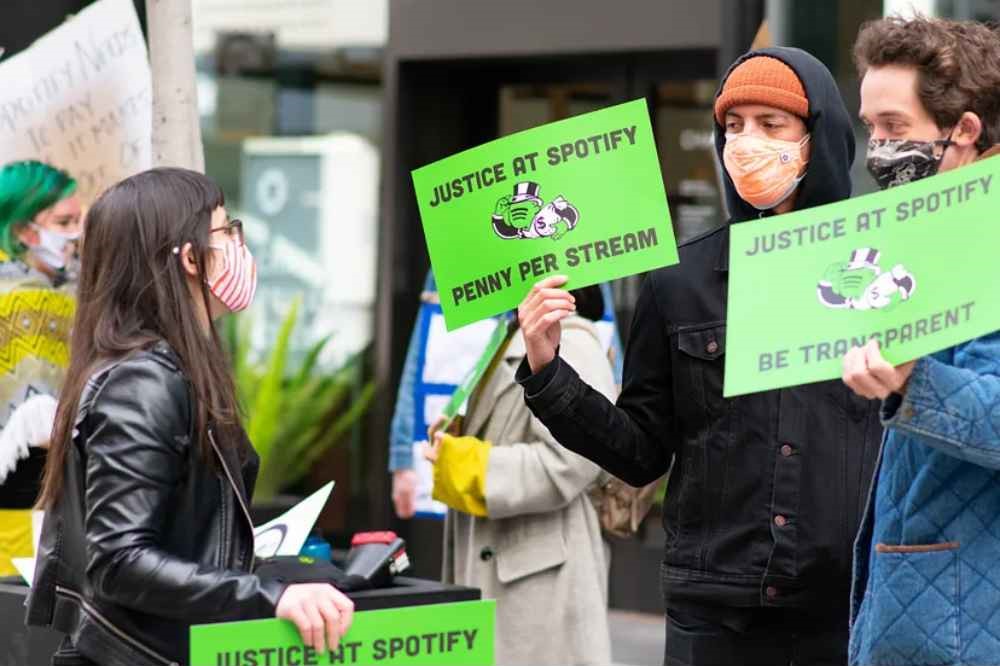Music streaming has transformed the way we consume music, with platforms like Spotify and Apple Music offering convenient access to millions of songs. However, for many artists, this shift has led to frustrations over unfair compensation. In recent years, artists have increasingly spoken out against the royalties they receive from streaming services, sparking debates and legal battles over how streaming platforms pay creators. This article explores the ongoing streaming royalties controversy and the efforts by artists and advocates to ensure fair pay for musicians.
The Fight for Fair Royalties
One of the most prominent movements addressing this issue is the Union of Musicians and Allied Workers’ (UMAW) “Justice at Spotify” campaign. Launched in 2020, this campaign calls for Spotify to increase its per-stream royalty rate to at least one cent. Currently, Spotify pays artists an average of $0.0038 per stream, meaning it takes roughly 263 streams for an artist to make just one dollar. This rate is widely criticized as unsustainable for independent and smaller artists, who struggle to make a living under such conditions. UMAW has also called for greater transparency in Spotify’s dealings with major record labels and an end to unfair practices like payola-style playlist placements.
The campaign represents the growing frustration among musicians, particularly in the wake of the pandemic, which has decimated live music revenues. As more musicians rely on streaming platforms for income, the demand for fair compensation has become more urgent.
Recent Legal Battles and Legislation
Artists are not only rallying for change through campaigns but also pursuing legal avenues. In the European Union (EU), musicians have pushed for regulatory changes that ensure fairer pay from streaming platforms. Earlier this year, the European Parliament voted overwhelmingly in favor of creating a legal framework to increase transparency and improve royalty payments for musicians. This framework addresses unfair revenue distribution, which currently favors major labels and popular artists while leaving emerging and independent artists struggling to gain fair compensation and visibility.
These recent developments in the EU mark a significant step toward reshaping the streaming landscape, but the fight is far from over. While these regulatory frameworks signal progress, they are not binding, and artists continue to press for binding reforms both in Europe and globally.
Why Artists Are Pulling Music from Streaming Platforms
Some artists, disillusioned with the lack of fair pay, have taken more drastic steps—removing their music from streaming platforms entirely. For instance, earlier this year, artists like Neil Young and Joni Mitchell removed their catalogs from Spotify, citing ethical concerns over both royalties and the platform’s support for controversial figures like Joe Rogan. Although Young’s actions were driven by multiple factors, including misinformation on the platform, his decision underscores the dissatisfaction many artists feel with the streaming model.
These high-profile removals have sparked wider conversations about how artists can regain control over their music. Some artists are exploring alternative platforms that promise fairer compensation or are choosing to release their music independently to maintain control over their earnings.
The Broader Industry Impact
The controversy over streaming royalties has broader implications for the music industry. Critics argue that streaming platforms have commodified music, reducing it to a volume-driven model where only the most popular songs and artists can make a sustainable income. Meanwhile, independent artists—who make up the majority of musicians—are left behind, unable to compete with algorithmically favored, mainstream content.
As artists continue to push for reforms, there is growing recognition within the industry that changes are necessary. Some solutions proposed include adopting a user-centric payment model—where revenue is distributed based on individual user habits, rather than the platform-wide popularity of tracks—as well as introducing legal mandates to improve transparency in platform algorithms.
Conclusion: The Future of Streaming Royalties
Music Industry Weekly understands that the streaming royalties controversy is not going away anytime soon. As more artists and advocates rally for fair compensation, we can expect further pressure on streaming platforms to reform their royalty structures. Recent campaigns and legislative efforts in both the U.S. and Europe suggest that change is possible, but it will require sustained efforts from artists, industry stakeholders, and lawmakers alike.
Ultimately, the debate over streaming royalties highlights the need for a music industry that values creativity and artistry over profit. The fight for fair pay is about more than just money—it’s about protecting the livelihood and artistic integrity of musicians in an increasingly digital world.








